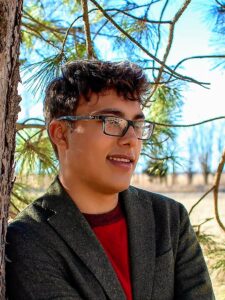
Josué Coy Dick was born in Guatemala and grew up in North Newton, Kansas. He is currently a student at Bethel College in North Newton, Kansas. He is majoring in peace and conflict studies and music performance. He is a member of the Bethel College Community for Justice and Peace, the Bethel College orchestra and serves as a student chaplain. He has long attended Shalom Mennonite Church in Newton, Kansas, and remains an active member.
______________________________________________
I was recently given the opportunity to attend the Hope for the Future conference as a representative for Bethel College, in North Newton, Kansas, and it was an enriching experience. The conference gave me optimistic energy about the future of the Mennonite church. The strength of our active and inclusive theology was evident. It was my first time attending, and I had never been around so many devout, active BIPOC (Black, Indigenous and people of color) Mennonites. I appreciated hearing from academic scholars of the Bible, as well as from activists, who all provided valuable insights, including new interpretations of biblical passages and new ways of applying our faith to the many injustices in our world.
I remember distinctly that the theme of not just belonging in, but claiming possession of, the church was something that came up several times. Being one of the few BIPOC Mennonites in my community, this was not an idea I was very familiar with.
It was empowering to hear it said with pride that BIPOC folks are not just visitors or additions to the Mennonite church, but we, in fact, are the church.
There were people at the conference who were the only person of color in their congregations, and there were others who came from congregations that were majority non-white in non-white communities. Our different perspectives on what it means to be Mennonite made for rich conversation.
I really appreciated the intergenerational aspect of the conference. In typical white spaces, there is not often intentional room given for intergenerational learning, and the voices of elders and young people are often ignored. The Hope for the Future conference intentionally gave space to all voices and provided many opportunities for conversations across generations, in which we could share about our diverse knowledge and experiences. As a young person, I found it particularly valuable to hear from elders who had been members of the Mennonite church for a long time and had different perspectives on the nature of the Mennonite church. I admired their patience and dedication.
There was a great energy and commitment to the Mennonite faith and tradition that gave me hope for the future of the church. I was amazed that, despite such trials and tribulations, many BIPOC members of the church were still willing, and even proud, to be Mennonite. I was re-energized to go back to my own mostly-white community to keep engaging, despite our differences and difficulties. There was a strong commitment to Mennonite values and theology that resonated with me.
I would encourage others to attend this conference, if given the opportunity. It is not stressful, rushed or overwhelming. On the contrary, it is refreshing and essential. It was a great way to get to know people from around the country who are doing good work and who’s life experiences resonated with me.
This was a place where BIPOC members of the church could gather and speak freely about their Mennonite faith and their relationship with the Mennonite church: the good, the bad and the ugly.
The views and opinions expressed in this blog belong to the author and are not intended to represent the views of the MC USA Executive Board or staff.
Interested in submitting a blog for Menno Snapshots? Please see our blog guidelines here.

